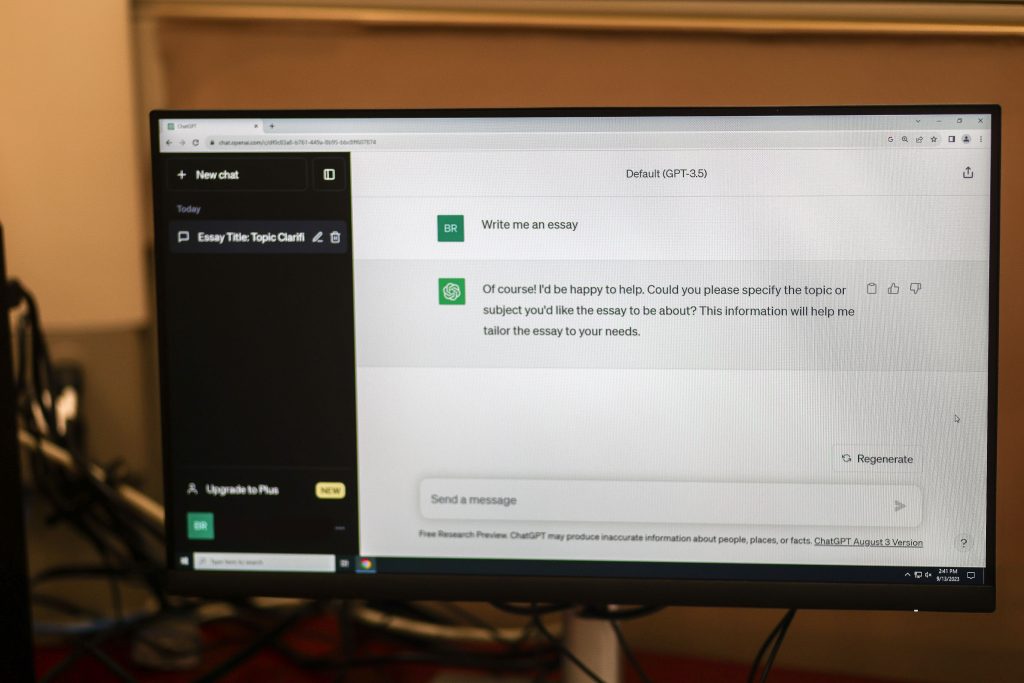The rise of artificial intelligence and ChatGPT may lead to lasting changes in academia.
Since launching in 2022, ChatGPT, an “AI-powered language model,” has about 100 million monthly users and can be used to perform various tasks, ranging from creating recipes to advanced statistical analysis. It can also synthesize information from a textbook or solve complex math equations. Its rapid growth, combined with the proliferation of similar tools, has led to debates in academic departments across the country about its role in the future of learning.
Nathanael Andrade, chair of Binghamton University’s history department, described how faculty in his department have reacted to ChatGPT and similar tools.
“One main concern is that ChatGPT — [and other software] — will enable students to sidestep learning processes and practices that are fundamental to their ability to build critical thinking and writing skills,” Andrade wrote in an email. “As such, we have been having a protracted conversation in the department about best practices for approaching AI and ChatGPT, and we have sought advice from the Center for Learning and Teaching (CLT) on campus.”
While some faculty members appear to be skeptical about AI in the classroom, others seem more open to its use. Jinglu Jiang, an assistant professor in the School of Management, believes that it can be used effectively in a classroom environment. Jiang discussed the historical struggle of adaptation to new technologies, and how ChatGPT might compare to other search engines that have existed for decades.
“It’s worth noting that the emergence of ChatGPT isn’t the first time the educational community has grappled with integrating new digital resources,” Jiang wrote in an email. “We witnessed similar debates during the advent of modern search engines. These platforms, initially met with skepticism, eventually found their place in academia, as valuable starting points or supplementary resources.”
Jiang teaches MIS 450: Machine Learning. In the spring, as part of a research study, students were directed to use ChatGPT to complete one-half of the semester’s homework and Google search for the other half. They were required to submit their search histories and rank the effectiveness of both tools with each homework assignment. Jiang hopes that exposing students to the technology, rather than shielding them from it, will allow them to harness its effectiveness and use it to enhance their critical and analytical skills.
Other professors have incorporated specific language outlining the accepted use of ChatGPT and related tools in their classrooms. Shin Watanabe, a professor and co-director of the Binghamton Poetry Leadership Project, teaches creative writing. In his syllabus, Watanabe writes that “students may use artificial intelligence tools for generating ideas, but the final submitted assignment must be original work produced by the individual student alone.”
The University did not respond to a request for comment about the use of AI or any University-wide initiatives related to required language on syllabi.
Laura Baker, a junior double-majoring in English and economics, believes there is an ethical boundary when it comes to using ChatGPT. Its ability to write long-form papers has been a major discussion point.
“I think that the use of ChatGPT and other similar tools should be limited to outlines and research when completing assignments,” Baker wrote. “While ChatGPT should be allowed for the first steps in drafting an assignment, the final product should be reflective of a student’s own work. Using these tools to construct a rough outline can help organize material, however, beyond that I think it prevents one’s own ability to learn.”
Atticus Fauci, a sophomore majoring in economics, shared how he believes the technology might be useful to faculty.
“If AI can make the professor’s life easier and the quality of education better, I don’t see why [it should not be used],” Fauci wrote in an email. “At the college level, I think it’ll change the way we think of papers and reading assignments. I could see it replacing teacher’s assistants and/or tutors. Once AI gets advanced enough, I think it could be super effective in a tutoring sense, helping answer any student’s questions.”



